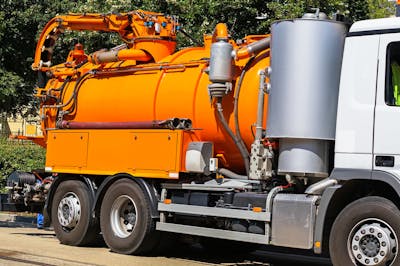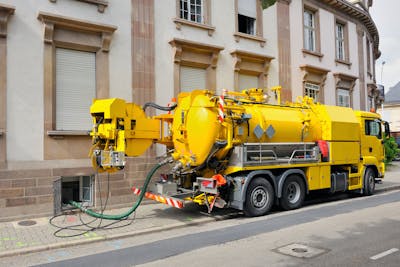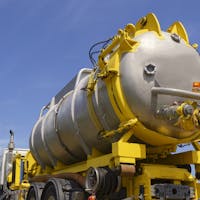Find the Best Sucker Truck Hire Near You
- Post a job
- Receive multiple quotes
- Choose your preferred Sucker Truck suppliers
Where do you need Sucker Truck Hire?
Describe your job and our suppliers will send you quotes
771 Sucker Trucks for Hire on iseekplant
The right sucker truck for your project can significantly affect efficiency and overall cost. With 771 sucker trucks available for hire on iseekplant, you have many options tailored to diverse project needs.
Our directory ensures you find the ideal fit, from those specially designed for urban areas, such as vacuum trailers, to robust models like hydro excavation trucks equipped for heavy-duty tasks in construction zones.
This guide highlights sucker trucks, covering their hire rates and typical capacities. We'll also look into the disposal of spoil and wet materials, as well as the commercial and civil applications of these trucks.
Sucker Truck Hire Rates Guide
Sucker truck hire rates can vary depending on several factors, including the truck's capacity, location and hire duration. To help you decide the best options, we've prepared a rates guide below:
| Size/Capacity (kilo litre) | Dry Hire Rates (per day) | Wet Hire Rates (per day) |
|---|---|---|
| Small (1KL - 3KL) | $450 - $600 | $700 - $850 |
| Medium (4KL - 7KL) | $650 - $800 | $900 - $1,050 |
| Large (8KL - 12KL) | $850 - $1,000 | $1,100 - $1,250 |
Note: Rates vary depending on the machine's age, brand and location within Australia. All prices listed in this section are estimates, exclude GST and are in AUD.
Additional Costs to Consider When Hiring a Sucker Truck
As with all other hires, hiring a sucker truck entails additional costs related to operating the truck. Make sure you account for these additional expenses when working with a supplier:
| Cost Type | Standard Rate | Description |
|---|---|---|
| Operator Charges | $50/hr | Charge for hiring a trained sucker truck operator |
| Fuel Surcharge | $1.50 - $3.00/L | Cost applied due to fuel consumption; may vary depending on market prices. |
| Disposal Fees | $100 - $200/ton | Fees associated with disposing of collected materials |
| Maintenance & Breakdown | $200 - $500 | Costs in case of truck maintenance or any sudden breakdowns |
| Transport/Delivery Fees | $100 - $500 | Varies based on distance to the job site |
Remember that the rates we posted here are estimates and will change depending on your project needs. Make sure to use our Get a Quote tool to connect with our network of suppliers to find the right sucker truck today!
Common Sucker Truck Water and Spoil Capacities
Sucker trucks are indispensable assets in numerous Australian industries. These vehicles transport liquids, sludges and slurries through their potent suction capabilities.
Their classification is primarily based on water and spoil capacities. Identifying the right capacity for your project can result in a significant uptick in productivity and reduced expenses.
Leading Sucker Truck Brands and Their Significance
When talking about sucker trucks, these brands stand head and shoulders above the rest of the pack:
- Isuzu: Synonymous with reliability in the heavy machinery landscape, Isuzu consistently delivers vehicles built to last.
- Kenworth: Best known for their robust engines and cutting-edge technology, Kenworth sucker trucks consistently shine, even in demanding terrains.
- Mack: The robustness and dependability of Mack trucks make them the first choice for many in arduous tasks.
The table below highlights these brands’ notable models, specs, capacities and pros and cons:
| Brand | Notable Models | Quick Specs | Water Capacity | Spoil Capacity | Pros | Cons |
|---|---|---|---|---|---|---|
| Isuzu | NLR 55-150 | 4-cylinder, 150 HP | 1,000 L | 2,000 L | Efficient for minor tasks, excellent maneuverability | Limited capacity |
| Kenworth | T410 | 6-cylinder, 310 HP | 3,000 L | 5,000 L | Perfect balance between capacity and mobility | May require multiple trips for larger jobs |
| Mack | Granite GU713 | 6-cylinder, 435 HP | 5,000 L | 8,000 L | Ideal for expansive projects, fewer trips necessary | Greater fuel usage, more challenging to navigate |
Other Considerations When Hiring a Sucker Truck
Aside from capacities, brands and models, there are a few more things you must consider when choosing the truck and supplier. This section highlights some non-technical factors you should consider in your selection process.
- Maintenance Costs: Knowing the maintenance requirements and intervals for specific models can help avoid downtime and ensure longevity, especially for long-term hires.
- Operational Tips: How to operate the sucker truck more efficiently, especially in specific terrains or scenarios, can be crucial.
- Environmental Considerations: Highlighting the eco-friendly features of specific models or brands can guide environmentally-conscious decisions.
- Cost of Operation: Apart from just the hire rates, detailing the operational costs can offer a clearer picture of the total expenses involved.
Disposing of Spoil and Wet Materials
When working with sucker trucks, an integral part of the process involves the efficient and compliant disposal of spoil and wet materials. Both types have unique disposal methods that must be followed to ensure environmental safety and adhere to local regulations. Let's examine the proper disposal of these materials in this section.
Spoil Material Disposal
Spoil materials refer to the excess or waste soil, rock or other materials excavated or dredged from a site. These steps ensure the proper disposal of spoil materials:
- Identification: Identify the type of spoil before disposal to determine the best disposal method. Each type might have different environmental and health risks.
- Storage: Store the spoil in appropriate containers or storage areas. Proper storage prevents contaminants from spreading and makes transportation easier.
- Transportation: Use designated vehicles or equipment to move the spoil to the disposal site. Ensure the vehicles are equipped to handle the spoil type without causing spills.
- Disposal: Dispose of the spoil at approved disposal sites. Some spoil types may require special disposal techniques or facilities.
Wet Material Disposal
On the other hand, wet materials are typically mixtures of water with other substances. This category includes mud, sludge or other semi-liquids that arise from construction or excavation tasks. The steps below outline the correct disposal of wet materials:
- Separation: Separate the water from other materials. This might involve using settling tanks or other separation equipment.
- Treatment: Treat the separated water, if necessary, to remove contaminants or pollutants. Treatment ensures the water is safe for disposal or reuse.
- Storage: Store the treated water in appropriate tanks or containers. This step is vital, especially if the water will be reused.
- Release or Reuse: Depending on the quality of the treated water, it can be released into the environment or reused for other purposes. Always adhere to local regulations when releasing treated water.
Enhancing Disposal Practices: Tips and Recommendations
Following baseline steps is fundamental when disposing of spoil and wet materials. However, that doesn't end there. To ensure your project complies with regulations and the best industry standards, looking into some enhanced approaches can make your operations more efficient.
Here are additional considerations and recommendations that can help streamline the disposal process, save costs and be more environmentally conscious:
Regulatory Guidelines
Understanding and adhering to regulations is crucial. In Australia, the Environmental Protection Act 1994 primarily governs waste disposal, including spoil and wet materials.
Specific guidelines and standards may vary by state/territory, but the Department of Environment and Science offers detailed resources. Always ensure you're referencing the latest version of these guidelines.
Suggestion: Before commencing any disposal activity, check with local councils or state regulatory bodies that can provide up-to-date information tailored to your region.
Disposal Site Recommendations
Selecting the appropriate disposal site is pivotal for effective waste management. Facilities like Brisbane Inert Landfill and Melbourne's Western Landfill are recommended for inert spoil. Facilities equipped to handle liquid waste, like Sydney's Kimbriki Resource Recovery Centre, can be considered for wet materials or sludges.
Suggestion: Engaging with local waste management consultants or organisations can provide tailored disposal site recommendations.
Environmentally Friendly Practices
Environmental sustainability should be a top priority. Consider practices such as:
- Recycling: Many wet materials, especially in construction, can be processed and reused.
- Natural Processing: Allowing organic wet waste to undergo anaerobic digestion produces biogas, which can be harnessed for energy.
- Minimise Waste Production: Opt for processes that generate less waste, thereby reducing the need for disposal.
Suggestion: Stay updated with the latest advancements in waste management technology and practices to adopt greener methods.
Cost Implications
Effective disposal is not just about compliance but also about cost-efficiency. Consider the following:
- Volume-Based Charges: Most disposal sites charge based on the volume or weight of waste. Ensure accurate measurement to avoid overpaying.
- Tax Breaks & Incentives: Some states offer tax incentives for companies adopting sustainable waste disposal methods.
- Penalty Costs: Non-compliance can result in hefty fines. Staying informed and compliant can prevent these unforeseen expenses.
Suggestion: Regularly assessing and comparing the costs associated with various disposal methods can lead to significant savings in the long run.
Commercial & Civil Sucker Truck Applications
Sucker trucks have found their way into numerous commercial and civil applications due to their versatility:
- Construction Sites: Ideal for removing excess water, sludge and debris from construction zones.
- Sewer and Drain Cleaning: Used for regular maintenance, reducing blockages and improving flow.
- Mining Operations: Assists in removing mud, slurry and wastewater from mining sites.
- Roadside Cleanup: Effective in managing spills or floods on highways or urban streets.
To decide on the right sucker truck for your project, it's crucial to analyse the specific demands of the application.
Looking to Hire a Sucker Truck?
Whether you're in the city or the outback, with our extensive directory of 771 sucker trucks, finding the perfect match for your project has never been easier. Looking for other machinery? We can also connect you with our suppliers of backhoes, compactors, dump trucks and everything your site needs.
Get in touch with us at iseekplant by emailing us at projects@iseekplant.com.au or dialling us at [1300 691 912](tel:1300 691 912). If you're ready to go, click 'Get a Quote' and let's get rolling!
Popular Sucker Truck Hire Locations
Become a supplier
Recent Sucker Truck Hire reviews
"Pat and the crew are down to earth & get the job done. Smaller trucks = affordable solutions."
- HarryView profile"Used LVT Civil to pot hole services, really professional and hard workers no time wasting with this crew. Got in and got the job done. Definitely use ..."
- RichardView profile"Great work! Booked a car park sweep. Came on time and were very professional. Price was good also."
- Eric BenView profileHow It Works
Sucker Truck Hire FAQs
Here are some frequently asked questions and tips on finding the right sucker truck supplier for your job.
What do we have to offer?
Want to Know More?

Do you Need a Licence to Operate a Vacuum Truck?
Whether you need a license to operate a vacuum truck or not can be a di...

What are the best vacuum truck manufacturers?
When you’re looking to hire a vacuum truck for a vacuum excavation job...


